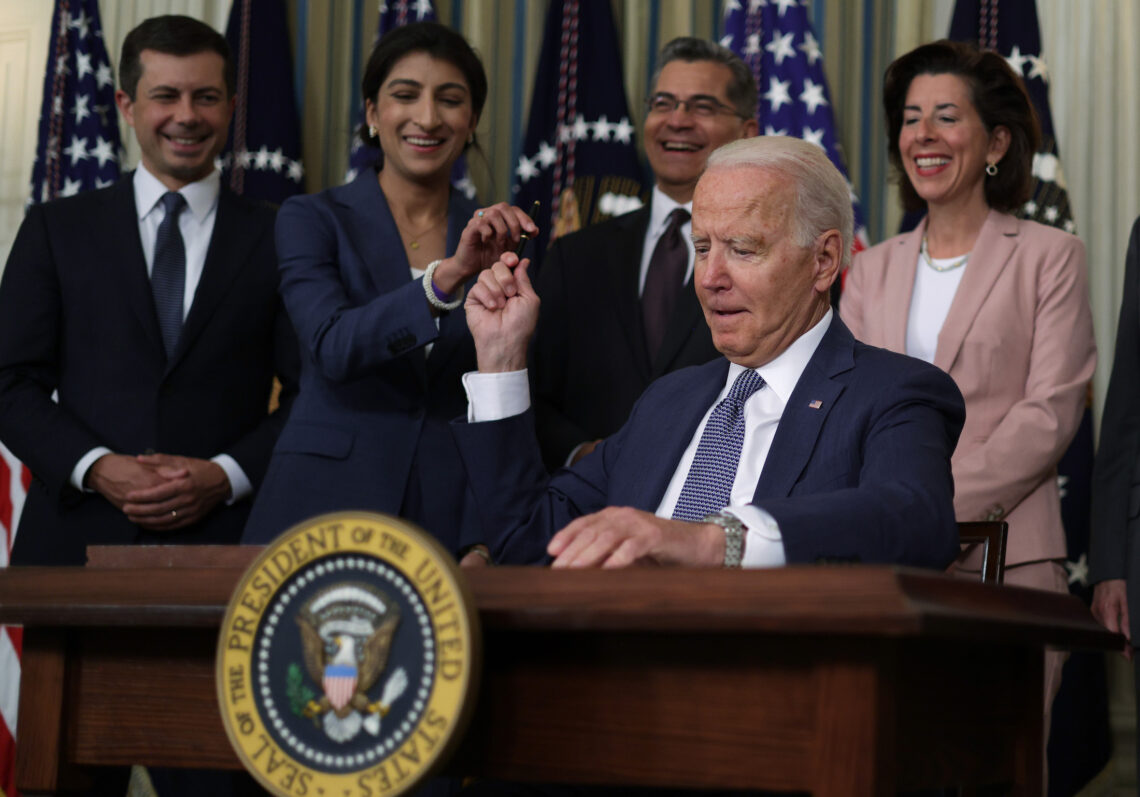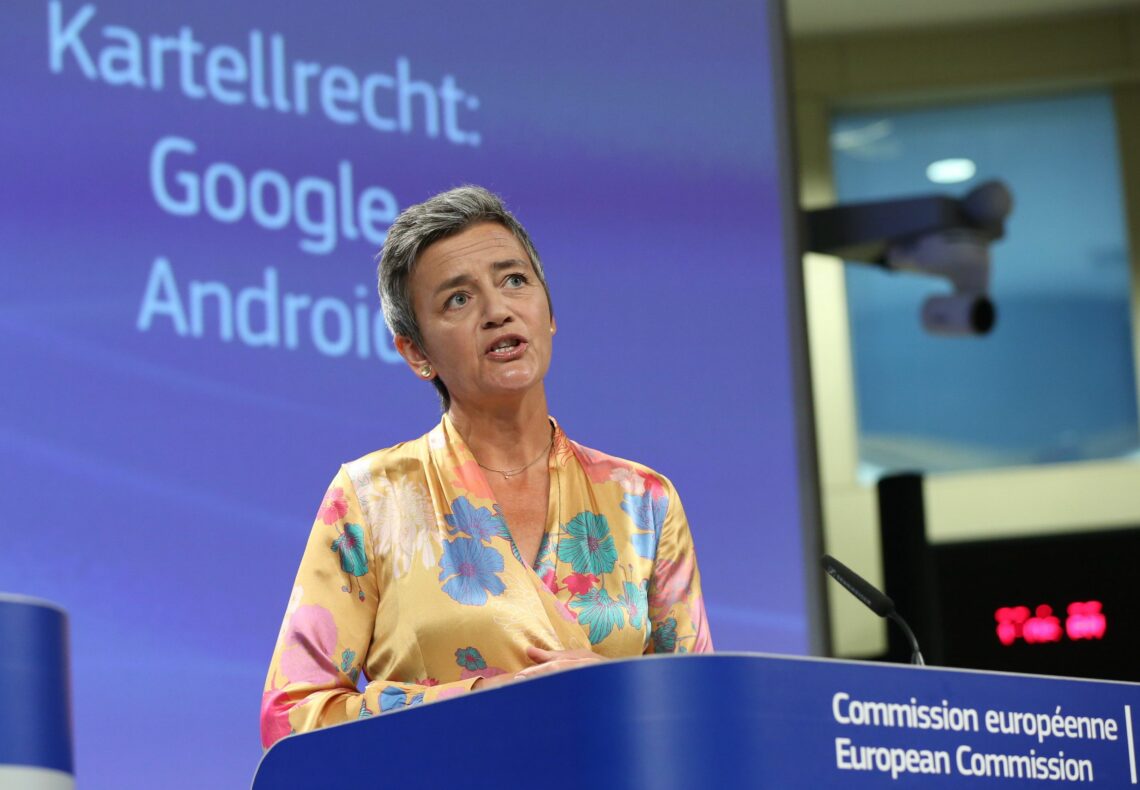Risks of a U.S. antitrust turn
Political efforts to resurrect abandoned antitrust policies is bringing the U.S. closer in line with European practices. The fate of free enterprise may soon rest in the hands of the judiciary.

In a nutshell
- Radical changes to U.S. antitrust policy are being sought
- The effects of similar moves in the EU should cause concern
- U.S. courts may decide where the political pressure leads
Antitrust policy does not often grab headlines, but the radical changes now sought by American progressives and populists are certainly newsworthy. Of particular note are their efforts to resurrect an interventionist antitrust framework that was abandoned by the United States decades ago, but has been perpetuated by the European Union.
Until recently, the divergence between Washington and Brussels on antitrust enforcement framed a global dichotomy. On the one (invisible) hand, the American “consumer welfare standard” regulated market behavior in the context of consumer effects such as the supply, quality and price of goods and services. On the other hand, the European approach entails government intervention to achieve politically prescribed economic and social goals.
The rise of large technology firms has been the primary catalyst for the antitrust overhaul now underway in the White House and Congress. Along with proposed regulatory and statutory changes, the U.S. Department of Justice, the Federal Trade Commission (FTC) and dozens of state attorneys general are also pursuing antitrust cases against Google, Apple, Amazon, Facebook and Microsoft.
It remains to be seen whether U.S. courts will cooperate. Decades of antitrust jurisprudence has generally restricted government attempts to reconfigure markets. Two months ago, for example, federal Judge James E. Boasberg dismissed as “legally insufficient” two antitrust lawsuits against Facebook by the FTC and a coalition of states. The New York Times characterized the case as “a stunning setback to regulators’ efforts to break up Facebook.”
It remains to be seen whether U.S. courts will cooperate with the new approach.
The European Commission (EC) has faced no such constraints, levying multimillion euro fines against “Big Tech.” (The 2.4 billion-euro penalty issued against Google four years ago remains on appeal.) This situation helps to explain, at least in part, the lack of tech dynamism across much of the continent. Critics of EU regulators also warn that these results should deter U.S. policymakers from abandoning American leadership in tech innovation by following in Brussels’ footsteps.
Evidence of convergence
Several recent developments signal a U.S.-EU convergence on antitrust. President Joe Biden’s appointment of antitrust activist Lina Khan to head the FTC recalls the trust-busting fervor of the Progressive Era, when U.S. Supreme Court Justice Louis Brandeis popularized the notion that corporate dominance and success were proof of illegitimate means.
FTC Chair Commissioner Khan has wasted no time in exploiting her power. Less than a month after taking office, she spearheaded the rescission of the Commission’s 2015 endorsement of the consumer welfare standard, asserting that the FTC would not have to show a likelihood of harm to competition before declaring conduct unfair. The new Democratic majority on the Commission also eased requirements for launching investigations – allowing a single commissioner, rather than a majority vote, to initiate “compulsory process,” the body’s inquiry proceedings. Ms. Khan followed up with a gag order on all FTC staff.
There was surprise, then, that after a July 2 videoconference with Ms. Khan, EC Executive Vice President Margrethe Vestager said she expects “much more intense work when it comes to technology and the digitized market” between her team and Washington. Following President Biden’s June visit to Brussels, the U.S. and the EC announced the creation of an EU-U.S. Trade and Technology Council to “facilitate cooperation on regulatory policy and enforcement,” among other goals.

The EC has also been advising U.S. regulators on antitrust cases launched last year. According to Olivier Guersent, the EC’s director-general, “We explained the traps we fell into and the problems we had, so they would benefit from our learning curve and gain time.”
Cost-benefit calculation
The regulatory cheerleaders are apparently oblivious to the effects of weaponizing antitrust policy, which will erode American competitiveness. For example, the EC’s newly proposed Digital Markets Act would regulate large American platforms (but not Chinese or Russian) as public utilities, forcing them to cede access to proprietary operating systems and other intellectual property.
Moreover, regulation tends to reinforce the status quo rather than promote reform. Dominant players can afford the costs of compliance more easily than nascent firms. Bureaucratic inflexibility inhibits investment in innovation and new ventures.
Mr. Biden’s Democratic predecessor was far savvier about the dynamics at work. As Barack Obama told Kara Swisher: “Sometimes the European response here is more commercially driven than anything else. … We have owned the Internet. Our companies have created it, expanded it, perfected it, in ways that [European providers] can’t compete [with]. And often times what is portrayed as high-minded positions on issues sometimes is designed to carve out their commercial interests.”
Back in Washington, President Biden also appointed legal scholar Tim Wu, a prominent critic of “Big Tech,” to lead technology and competition policy at the White House. Mr. Wu reportedly authored a July 9 executive order on competition, incorporating a “whole of government effort” – 72 directives to more than a dozen federal agencies – to “promptly tackle some of the most pressing competition problems across our economy.” According to the executive order, “excessive market concentration threatens basic economic liberties, democratic accountability, and the welfare of workers, farmers, small businesses, startups, and consumers.”
All of this is rather puzzling given that the “fact sheet” accompanying the executive order boasts of a “booming economy” under President Biden’s leadership. Which is it: a booming economy, or one beset by oligopoly, unemployment, and corruption?
Indeed, many of the administration’s claims about competition either lack credibility or are outright false. For example, the White House asserts that Americans lack access to broadband services as a result of limited competition. In fact, 95.6 percent of Americans in 2019 were able to access fixed terrestrial broadband at speeds of 25/3 Mbps, the benchmark for advanced telecommunications capability.
Regulation tends to reinforce the status quo rather than promote reform.
The White House also gives undue credence to a Democratic staff report summarizing last year’s House hearings on competition in digital markets. A variety of critics have assailed the report as more propaganda than fact. Among them is economist Alan Reynolds, who said, “the cited survey evidence only demonstrates the authors’ technological ignorance and economic illiteracy.”
A package of bills that would dramatically increase Washington’s power over internet platforms is winding its way through Congress. Even conservatives are lending support – and, in doing so, abandoning fundamental free-market principles. Missouri Republican Senator Josh Hawley, author of “The Tyranny of Big Tech,” wants to prohibit companies with a market cap exceeding $100 billion from acquiring or merging with other businesses.
Such an approach disregards the fact that the government is ill-equipped to optimize markets – especially those driven by ever-changing technological innovation. The likelihood of policy and regulatory blunders is very high, and the potential consequences – such as solidifying the dominance of incumbents for years to come – are quite grave. The inflexibility of regulation inhibits investors from customizing competitive strategies for their circumstances, and instead forces them to act on standards based on political expediency. What better example of the consequences than the results in Europe?
Scenarios
The forecast is mixed about the extent to which all the political noise in Washington will yield results. President Biden’s executive order is administrative policy, not law. But tightening the regulatory noose around mergers and acquisitions has the potential to slow investment and gains in productivity.
The administration will most certainly actively pursue antitrust cases in a variety of sectors – including technology, pharmaceutical and agriculture – all of which will undermine market dynamism. Congress has failed for years to enact legislation to regulate the internet, although a modicum of bipartisan support could make a difference this time.
That will leave the fate of free enterprise largely in the hands of the judiciary. Donald Trump’s appointments to the U.S. Supreme Court may turn out to be the last refuge of American economic freedom.







